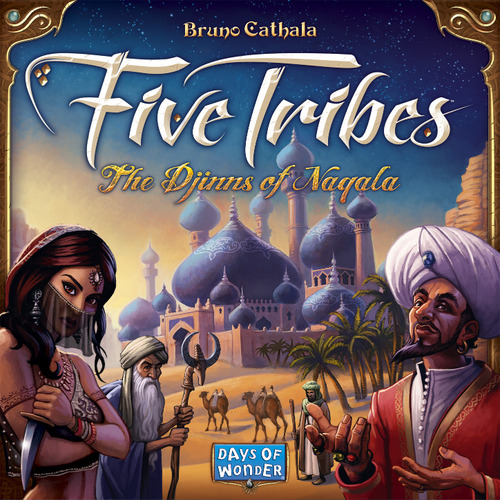
Days of Wonder have a reputation for creating fantastic board games, mixing some top-end build quality with easily accessible rules which allow a younger generation of gamers to join in and enjoy everything that they have to offer. So what happens when Days of Wonder take a little side step and make something a little more complex? I’m not talking 30 page rule books, or cards with 19 different actions on offer, but Five Tribes is most definitely a step up in terms of learning the ins and outs of how to play. But still, this has the stamp of a Days of Wonder game running through it, and is every bit as awesome as you’d expect.
We’ve also been trying out two expansions for Five Tribes: Artisans of Naqala and Thieves of Naqala – head to the second page of the review to find out more about them.
But on to the main game, and why I like it. The rules themselves are far easier to learn by playing than reading, so I won’t go into them in too much depth here, but there are a few key mechanics worth knowing to emphasise why I enjoy this game so much. On a grid of desert-themed randomly places tiles there are numerous randomly placed meeples, with five different colours denoting the five tribes in the game (hence the name). After bidding for turn order, each player in turn picks up all the meeples on a square and places them down one by one in a path leading from the initial square up until the point where the meeples in your hand have run out. At the final square the player collects all of the meeples matching the colour of the final one in their hand, and as such planning a suitable route and end point can dramatically change the outcome of your turn. Different coloured meeples have different purposes and score you points in various ways, and so players can decide whether aim for a certain way of collecting points, or just take it as it comes. Blue meeples are builders for example, and award points depending on surrounding tiles when they’re collected; the red assassins let you kill other meeples nearby, potentially clearing tiles or ruining other players’ strategies.
There are other considerations too; emptying a tile lets you place a camel on it (a beautifully designed wooden camel, naturally) which earns points and moves the game towards one of its ending criteria, and also lets you fire off the action on that tile which could earn you points, claim a djinn or take some items from the open market. The djinns, three of which are always available for all to see and pick from throughout the game, provide extra abilities to help you out; the marketplace lets you collect items under certain conditions with rewards later if you can collect high numbers of unique items. All of these ways to score points opens up a huge number of possible strategies to employ, but there’s one spanner in the works which makes this game so great to play: every time someone takes a turn, the board changes completely.
As a result of the meeple path which you create each time, dropping one on each tile in a Handsel and Grettel kinda way, the layout of the board is a constantly evolving element. Play with three or four people and there’s no way you can plan ahead, you need to think on your feet, improvise each time round and change your strategy to suit the board. You might be aiming to collect as many white Elder meeples as possible, but by the time your turn comes round that might not be a good option any more, so you opt to grab some assassins instead and start building a new tactic which may, in the same way, be totally torn apart by the time your turn comes round again. It’s a constantly changing puzzle, and as such it’s almost impossible to develop a favourite technique over time – there’s absolutely no guarantee that it’ll work from one game to the next. I love that about Five Tribes, having to play differently each time as a result of the random setup and unpredictable board changes between turns. I’m sure some people won’t be keen on the lack of long term planning, the fact that your ideas will start to crumble before they’ve even started to take place, but myself and my gaming group thought it fitted the nature of the game perfectly and were surprised by just how much we enjoyed it – we ended up playing this for several nights, which is quite rare for individual games.
And so Five Tribes finds itself very high up our list of games that we’ve absolutely loved. The added layer of complexity, while still being easy to learn, takes it to a different plane amongst some other Days of Wonder games and the entire experience is one which is utterly memorable and compelling. And that’s before you even think about plugging in one of the expansions, two of which you’ll find on the next page.
Unless you crave a game in which you can plan several moves in advance, this should be on everyone’s shopping list when you’re next headed to your nearby games shop. Very impressive.
Five Tribes
Available Now, RRP £46.99
Find your local stockist here

Leave a Reply